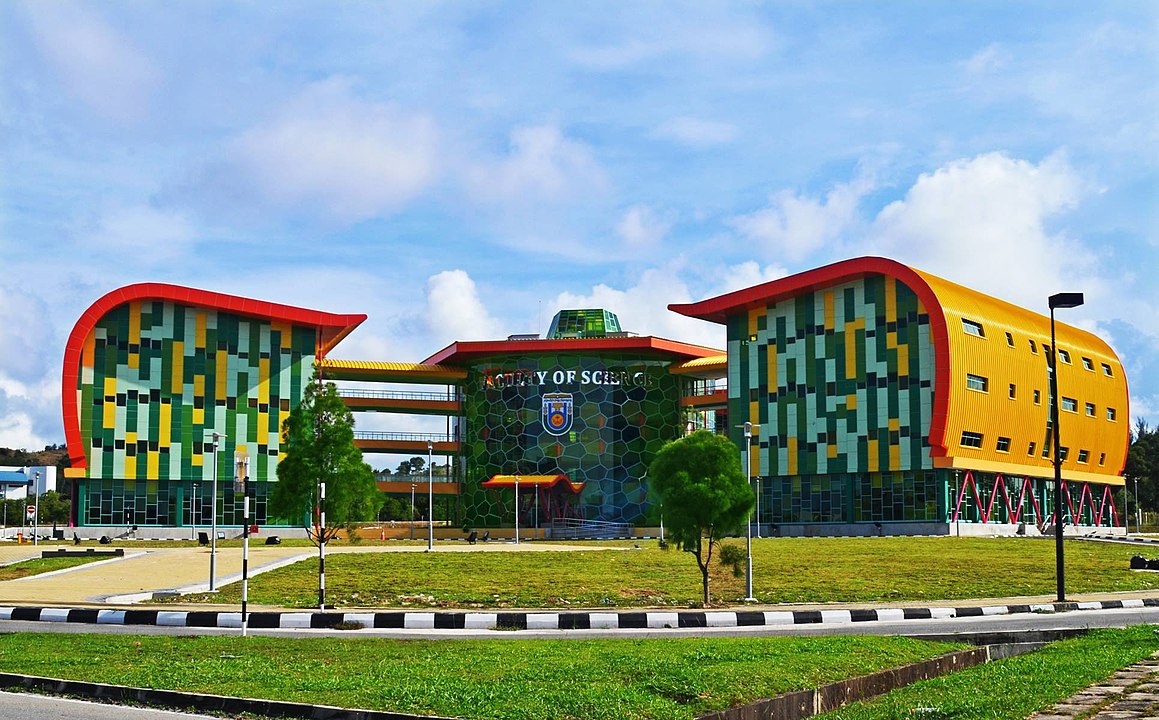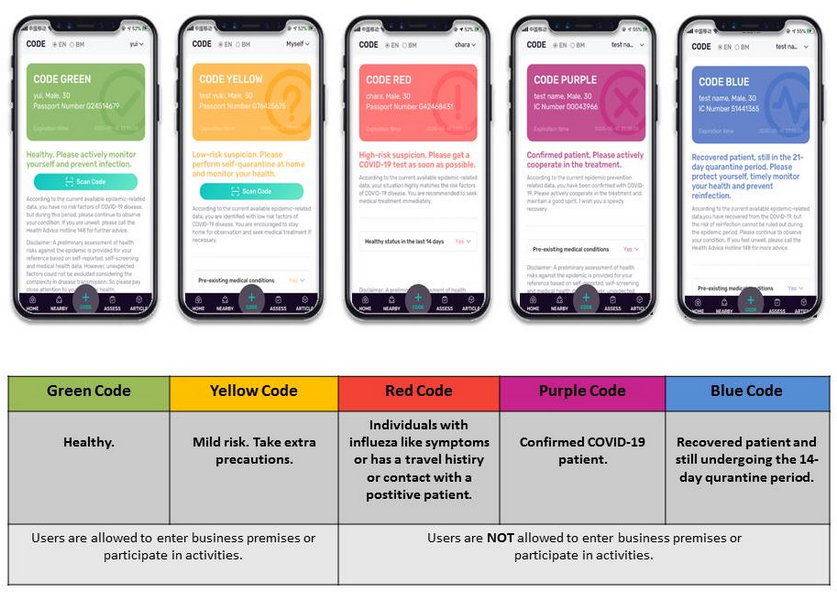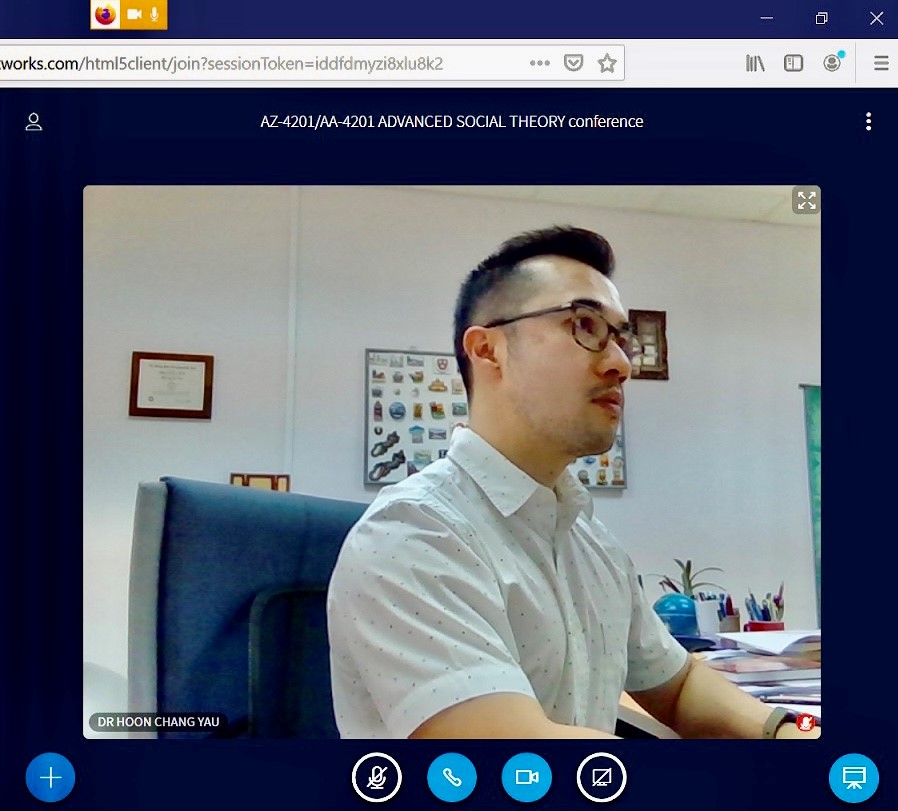
A student was giving her presentation on the online platform, Canvas Conference, when a repeated squeaking sound of door opening followed by passing footsteps on the wooden floor were heard. While it was slightly distracting, the sound was able to break the monotone of the online audio presentation, and thus was curiously entertaining to the class. Frustrated by her mischievous sibling who was entering and exiting the room, the presenting student apologized profusely for the noise. “Keep Annabelle in the Closet!”, the lecturer said on the microphone. The class burst out in laughter with “Ha Ha Ha”, “ROFL” and “LOL” on the public chat of Canvas Conference. Since then, the main character in 2014 the supernatural horror movie, Annabelle, which was also the name of the haunted doll, become the caricature to describe any audible background noise in the online class for the rest of the semester.
The unexpected switch from physical classes to remote learning took place at Universiti Brunei Darussalam (UBD) on 12 March 2020, merely three days after the first COVID-19 case was recorded in Brunei. While the swift announcement by the university to suspend all face-to-face classes was commendable, the abrupt transition left everyone in a limbo. Modules that had been using blended learning which combined physical classes with online instructions were relatively unaffected by the change compared to those that were using traditional place-based classroom method. Lecturers were left to their own devices to promptly employ the available online technologies such as Canvas, Zoom, Moodle and Microsoft Team to conduct classes.

Scheduled on the same morning when the announcement was made, my class on “Advanced Social Theory” was one of the first that went online. The mood in the first class was uncharacteristically somber as dark clouds of confusion, uncertainty and fear hovered over both students and I. Dry-wit humor, such as the “Annabelle” comment above, was one of the strategies I deployed in my online pedagogy in an attempt to diffuse anxiety and stress among students caused by the uncertainties of the pandemic.
Thankfully, life has gradually returned to normal in Brunei after the virus was contained in May and the final stage of de-escalation plan was implemented in late July. In response to the improving situation, UBD implemented 100% blended learning mode for the Semester 1, Academic Year 2020/2021, which had begun in August 2020. According to this mode, all lectures were to be conducted online; while tutorials, practical classes, laboratory and clinical sessions could be conducted physically on campus. The Teaching and Learning Centre had also organized a series of online workshops to build lecturers’ capacity in planning, designing and delivering online classes including assessment strategies.
Dubbed as an “unexpected COVID-19 success story” (Hayat 2020), Brunei has a total of 172 confirmed cases to date and three deaths since its first reported case on 9 March 2020. Approximately 84,000 people or around 19% of the population have been tested for COVID-19. While many countries in the world are still battling rising cases, there are currently no new active cases in Brunei. Apart from a handful of intermittent imported cases, the country has not experienced any further community spread since 7 May 2020.
The success of Brunei in combatting COVID-19 can be rightfully credited to the decisive leadership of the Monarch and the swift response of the government. To delay the spread of coronavirus to the sultanate, travel restrictions were placed on several Chinese cities as early as February 2020. Within a week after the first reported case, the country closed its borders to outgoing travelers and imposed a two-week self-isolation on all incoming travelers. To curb the spread of infections, the public was urged to maintain social distancing and high level of personal hygiene; mass gatherings, social meetings and dining in restaurants were banned; and schools, recreation centers and places of worship were temporarily closed.
The country took a “whole of nation approach” in managing the pandemic, wherein all ministries worked hand-in-hand together under the directive of Ministry of Health (MoH). The government has demonstrated competence in handling the situation with strong leadership and full transparency. For a few months when there were active cases, the Minister of Health – often joined by other ministers – held daily press conference to provide the latest information and policy updates to the public. The Q&A session during the press conference that was broadcast live through official media and various online platforms enabled unprecedented interactive dialogue between ministers and journalists. The “whole of nation approach” also witnessed generous donations made by businesses and individuals to the COVID-19 Relief Fund and assiduous efforts of youth volunteers who assisted with logistical arrangements at isolation centers and health clinics.
While planning and discussions on the Industrial Revolution 4.0 in Brunei had been ongoing for several years, the pandemic became an unexpected catalyst for the realization of these digitalization plans. Digital platforms have been increasingly used to replace face-to-face interaction in order to reduce the risk of the spread of COVID-19. One of the outcomes of the pandemic was the launch of a one-stop mobile application called BruHealth, which required users to scan QR codes at business premises and offices to allow MoH to conduct contact tracing in case of an outbreak. The app, which also contained functions such as COVID-19 self-assessment tool and updated news and information pertaining to the pandemic, has continued to develop new functions such as to allow users to book medical appointment and to conduct online medical consultation.

Higher education institutions like UBD were requested by the Ministry of Education to prepare a Business Continuity Plan at the start of the outbreak in Brunei. Besides shifting all classes online, UBD also implemented staggered work hours and gave staff the option to work from home. Phan et al. (2020) argue that the effect of COVID-19 on teachers might be gendered. Given the double burden of female educators at home and school, working from home can be more of a curse than a blessing. For others like myself, working from home had removed the boundary between work and life, and unwittingly made work, life. I found myself unable to experience physical and psychological break from work when the ritualistic practice of “going home” – packing up and leaving the office – became redundant.
While the pandemic has made remote learning a necessity rather than an option, the socioeconomic privilege of having access to the internet must not be ignored. Issues related to access to online technologies, and the speed of internet connection were ranked among the top challenges faced by students at UBD in the online surveys conducted by the university during COVID-19 (Shahrill, 2020). This is notwithstanding the fact that internet penetration in Brunei stood at 95% (Othman, 2020). The UBD surveys revealed that some students had limited or no internet connection at home and had to connect to the internet using their mobile phones. Their mobile phone bills soared drastically due to high data consumption, which resulted in extra financial burden to them.
Due to the difficulties in administering and invigilating online exams, the university allowed most modules to be converted to 100% coursework. However, this led to an increase in workload for students because they would need to complete extra assessments in lieu of the exams. The compound effect of all the disruptive changes caused by the pandemic was psychological and emotional distress experienced by many students. Hence, a Bruneian lecturer, Noorashid (2020), argues that the educator’s role was transformed from being a teacher and researcher to also a counsellor during the COVID-19.
When physical classes were suspended, I decided to use Canvas Conference to conduct most of my online classes. Canvas was the primary online technology to which UBD subscribed for all its modules. The Conference function allowed registered students to participate in virtual lectures, where the instructor could upload PowerPoint slides and conduct live video presentation. While the video function was also available to students, most of them preferred not to turn on their camera and only used audio and public chat functions. Without the visual, one was left to interpret sounds captured by the microphone such as that described in the prelude of this essay. Being camera shy also meant that Zoom did not work well for my module because most of the students refused to show their face.
Nonetheless, I was pleasantly surprised that students were more participative in typing their thoughts on the public chat than when they were in physical classroom. Perhaps this reflects the online text messaging culture to which the students were accustomed. Many of them who had not uttered a word in physical class were able to contribute their opinions liberally on the public chat, even as they knew that the public chat was not anonymous. The public chat also became a site for students to show support to their peers who were doing presentations with smileys and encouraging words.

To deliver a lecture with no visual connection to the audience can be a challenging task. I was not able to know if students were listening to me or were doing other things at the same time. Without the ability to read their facial expression as I did in a physical class, I also was unsure whether students could understand the concepts that I taught. To make sure that they stayed engaged, I regularly asked them for feedback and eagerly awaited their reassurance in the public chat.
While the primary focus during COVID-19 had been on physical hygiene, emotional hygiene must not be overlooked. Cognizant of the stress and anxiety that students were experiencing during that time, I endeavored to inject some humor in my online lectures whenever possible. The Annabelle joke was a case in point, although some students might have thought that it was lame. Sometimes in the middle of teaching, I would ask them to stop multitasking while listening to me: “This concept is important, please pause your K-drama” or “Your laundry can wait, let’s get through this topic now”. Knowing that I could not actually see what they were doing behind the screen, cracking a joke would at least lighten their mood during remote learning.
Admittedly, I do not have any foolproof pedagogy for the disruptive shifts that have taken place during the unprecedented time of the pandemic. While Annabelle does not exist in real life, many students are battling with their own noonday demon (aka, depression) amidst the climate of anxiety and fear. Genuine understanding, care and empathy from a lecturer may just be what is needed to keep Annabelle in the closet.
Chang-Yau Hoon
Chang-Yau Hoon is an Associate Professor and Director of Centre for Advanced Research (CARe) at Universiti Brunei Darussalam.
References:
Hayat, M. (2020, July 15). Brunei Darussalam: An unexpected COVID-19 success story. Australian Outlook. Australian Institute of International Affairs. Retrieved from http://www.internationalaffairs.org.au/australianoutlook/brunei-darussalam-an-unexpected-covid-19-success-story/
Noorashid, N. (2020, August 11). COVID-19 and responses from university teachers and students in Brunei: An initial overview and implications for research and pedagogy. Seminar presented at International and Comparative Education (ICE) Seminar Series, Universiti Brunei Darussalam.
Othman, A. (2020, June 8). Surge in internet, social media users in Brunei. Borneo Bulletin.
Phan, L.-H., Yabit, V. M. & Alas, Y. (2020, August 25). Effects of COVID-19 on educational policy and stakeholders in Brunei, Malaysia and Indonesia. Seminar presented at International and Comparative Education (ICE) Seminar Series, Universiti Brunei Darussalam.
Shahrill, M. et al. (2020, September 15). The Developments and Findings of Online Learning in UBD during the COVID-19 Pandemic. Seminar presented at International and Comparative Education (ICE) Seminar Series, Universiti Brunei Darussalam.
